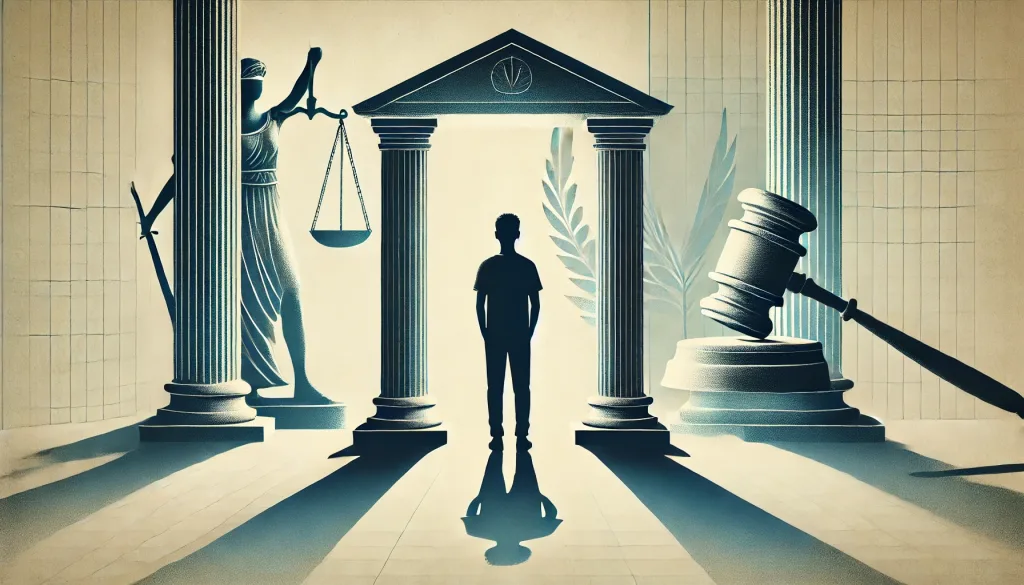Before we present to you the position of minors in criminal proceedings, whether they are accused or injured, it is important to define the concept of a minor, i.e. a minor – a minor is a person who, at the time of the commission of a criminal offense, has reached the age of fourteen (14) and has not yet reached the age of eighteen (18).

Within this age range, the legislator defines both the concept of a younger minor – a person who, at the time of the commission of a criminal offense, has reached the age of fourteen (14) and has not yet reached the age of sixteen (16), as well as the concept of an older minor – a person who, at the time of the commission of a criminal offense, has reached the age of sixteen (16), but has not yet reached the age of six (16), and has not yet reached the age of eighteen.
The legislator provides for the application of the Law on Juvenile Perpetrators of Criminal Offenses and the Criminal Protection of Juveniles, which entered into force on 01.01.2006. when the provisions of Chapter XXXIX of the Code of Criminal Procedure (procedures against juveniles) ceased to apply to these persons.
A person who was not four (14) years old at the time of the commission of the criminal offense cannot be sentenced to criminal sanctions or other measures provided for by the aforementioned laws.
In proceedings against juvenile perpetrators, the public is excluded and secrecy is omnipresent, thus respecting the sensitive age of the person against whom the proceedings are being conducted. All participants in the proceedings before the competent High Court must have special knowledge in the field of criminal protection of juveniles. It is precisely for the above reasons that there is a public prosecutor for juveniles, a judge for juveniles and lawyers specially specialized in representing in this area. The competent social work center often plays an important role in the procedure against a minor.
The purpose of the procedure is not to punish the minor per se, so the procedure is not conducted AGAINST the minor, but TOWARDS him – in order to properly influence him and so that special prevention in each individual case would lead to an adequate measure that the minor does not repeat the behavior prohibited by law.
One or more educational orders may be applied to a minor who has committed a criminal offense, the purpose of which is not to initiate criminal proceedings against the minor or to suspend the initiation of the proceedings, and the order affects the rules of development of the minor. An educational order may be applied to a minor by the competent public prosecutor for minors and a judge for minors, and only for criminal offenses for which a fine or imprisonment of up to five years is prescribed.
The conditions for the application of an educational order are:
– the juvenile’s admission of the criminal act committed and
– his/her attitude towards the criminal act and the injured party.
Types of educational orders:
1) reconciliation with the injured party in order to eliminate, in whole or in part, the harmful consequences of the act through compensation, apology, work or in some other way;
2) regular school attendance or regular work;
3) involvement, without compensation, in the work of humanitarian organizations or in social, local or environmental affairs;
4) submission to appropriate testing and withdrawal from addiction caused by the use of alcoholic beverages or narcotic drugs;
5) involvement in individual or group treatment in an appropriate health institution or counseling center.
When selecting educational orders, the competent public prosecutor for minors and the juvenile judge shall take into account the overall interests of the minor and the injured party, taking into account that the application of one or more educational orders does not interfere with the education or employment of the minor. Educational orders determined in this way may last for a maximum of six (6) months, during which time one educational order may be replaced by another or revoked, while the selection and application of educational orders shall be carried out in coordination with the parents, adoptive parent or guardian of the minor and the competent guardianship authority.
Criminal sanctions
The following criminal sanctions may be imposed on minors for criminal offenses committed, if there is no place for the application of educational orders:
1. educational measures,
2. juvenile detention
3. security measures, except for the prohibition of performing a profession, activity or duty.
Young juveniles may only be sentenced to educational measures as criminal sanctions.
Older juveniles may be sentenced to educational measures, and in exceptional cases, a sentence of juvenile imprisonment may be imposed.
Within the general purpose of criminal sanctions as set out in the Criminal Code of the Republic of Serbia, the purpose of imposing criminal sanctions on juveniles is to influence the development and strengthening of the juvenile’s personal responsibility, upbringing and rules of personality development, through supervision, providing protection and assistance, as well as ensuring general and professional training, in order to ensure the reintegration of the juvenile into society.
The purpose of juvenile imprisonment, in addition to the above, is to exert increased influence on the juvenile perpetrator not to commit criminal offenses in the future, as well as on other juveniles not to commit criminal offenses, therefore both as general and as special prevention, taking into account the repressive nature of such sanctions.
Educational measures:
1) only warnings and instructions: judicial reprimand and special obligations;
2) measures of increased supervision: increased supervision by parents, adoptive parents or guardians, increased supervision in another family, increased supervision by guardianship authorities, increased supervision with day care in the appropriate institution for the upbringing and education of minors;
3) institutional measures: referral to an educational institution, referral to a correctional home, referral to a special institution for treatment and training.
When choosing an educational measure, the court will take into account the age and maturity of the minor, other characteristics of his personality and the degree of disturbance in social behavior, the seriousness of the crime, the motives from which he committed the crime, the environment and circumstances in which he lived, his behavior after the criminal offense was committed, and in particular, whether he prevented or tried to prevent the occurrence of harmful consequences, compensated or tried to compensate for the damage caused, whether a criminal or misdemeanor sanction was previously imposed on the minor, as well as all other circumstances that they can be of influence in determining the measure that will best achieve the purpose of educational measures.
The court can issue a judicial reprimand to a minor if it can be concluded from the minor’s attitude towards the committed criminal act and his willingness not to commit criminal acts in the future that it is enough to just reprimand him, so this is the mildest type of sanction for a minor.
The court may impose one or more special obligations on the minor, if it judges that the appropriate requirements or prohibitions need to have a sufficient influence on the minor and his behavior. The court can impose obligations on the minor, such as: to apologize to the injured party; to compensate the damage he caused within his own means; that he regularly attends school or does not miss work; to train for a profession that corresponds to his abilities and inclinations; to get involved, free of charge, in the work of humanitarian organizations or in social, local or environmental affairs; to engage in certain sports activities; to undergo appropriate examination and rehab from addiction caused by the use of alcoholic beverages or narcotic drugs; to participate in individual or group treatment in the appropriate health institution or counseling center and to act according to the work programs drawn up for him in those institutions; to attend professional training courses or to prepare and pass exams that test certain knowledge; that he cannot leave his place of residence or stay, without the consent of the court and the special approval of the guardianship authority.
Juvenile prison sentence:
An older minor who has committed a criminal offense punishable by law with a prison sentence of more than five years may be sentenced to juvenile prison if, due to the high degree of guilt, the nature and severity of the criminal offense, it would not be justified to impose an educational measure.
Juvenile imprisonment cannot be shorter than six months or longer than five years, and it is imposed for full years and months. For a criminal offense for which a prison sentence of twenty years or a heavier penalty is prescribed, or in the case of a combination of at least two criminal offenses for which a prison sentence of more than ten years is prescribed, juvenile imprisonment may be imposed for up to ten years.
Security measures:
Security measures can be imposed on minors if they have been sentenced to an educational measure or a juvenile prison sentence.
The safety measure of compulsory treatment of alcoholics and the safety measure of compulsory treatment of drug addicts cannot be imposed with warning and guidance measures.
The security measure of compulsory psychiatric treatment and custody in a health institution can be imposed independently.
Adv. Mladen V. Aleksandrić
Law office
Guberina-Marinkov
